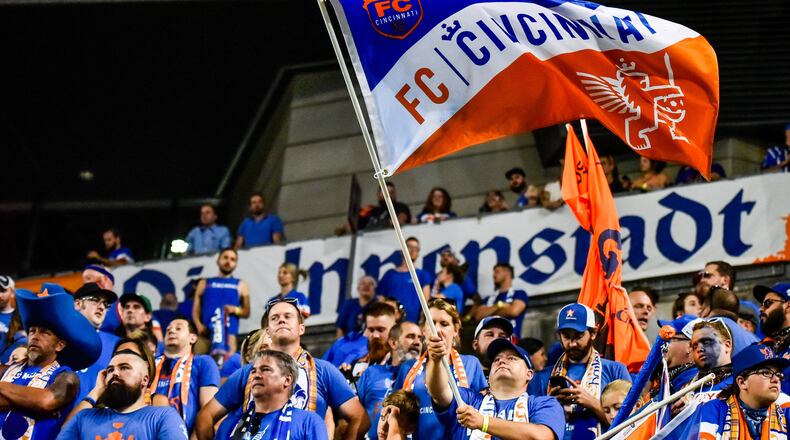»RELATED: FC Cincinnati’s final pitch to MLS
»RELATED: FC Cincinnati to finance own stadium
»RELATED: Design plans for proposed stadium
The two finalists not selected will remain in the mix, along with the other eight cities that applied for consideration in January, for the final two expansion clubs to be determined at a later time.
Here is a look at the four finalists and what they offer MLS, which is looking at ownership, market and stadium plans:
CINCINNATI
Ownership group: An impressive group of nine investors is led by billionaire American Financial Group co-CEO Carl Lindner III and Scott Farmer of Mason's Cintas Corp.
Market: Cincinnati ranks last among the 12 expansion cities for television market, checking in at 36th overall, but FC Cincinnati has out-proved its market size while averaging 21,199 fans in 2017, which would rank eighth in MLS. The city is is home to nine Fortune 500 companies, which is more per capita than New York City and Los Angeles and provides for plenty of sponsorship opportunities.
Stadium plan: FC Cincinnati is seeking to build a 21,000-seat expandable stadium in Oakley, privately financing the entire $200 million facility with public assistance for $75 million in infrastructure costs. The city of Cincinnati agreed to pay $37 million toward those expenses for roads and improvements in the area, while Hamilton County will chip in about $15 million for a 1,000-space parking garage. The club reportedly is asking for $10 million in state funds but it is unclear how the rest of the gap will be covered.
»RELATED: FC Cincy, Liberty Center announce partnership
Key to winning the bid: FC Cincinnati has a proven record with fan support unheard of at the Division II level, and is the most likely to be ready if MLS wants a team to jump in for 2019 to balance the conferences. Nippert Stadium is suitable for MLS games in the short term while the new stadium is under construction.
Credit: DaytonDailyNews
DETROIT
Ownership group: Detroit's bid is backed by NBA owners Tom Gores (Detroit Pistons) and Dan Gilbert (Cleveland Cavaliers), with the recent addition of the Ford Family that owns the NFL Lions. Gores and Gilbert have a combined worth of about $9 billion.
Market: Detroit is the third largest media market without an MLS team, 13th overall, and although already home to four major professional sports teams, the city has supported soccer at the lower divisions. Detroit has three Fortune 500 companies but another eight in the surrounding region.
Stadium plan: Gores and Gilbert announced in April a $1 billion investment at an unfinished jail site in downtown Detroit for a 25,000-seat stadium, but plans fell through, and at the 11th hour, the duo brought in the Ford Family with plans to share Ford Field with the Lions.
Key to winning the bid: The stadium plan didn't seem to sit well with MLS, but Detroit's biggest hope is that MLS can't pass up on the strength of this ownership group and the money they bring to the table.
NASHVILLE
Ownership group: Bid leader John Ingram is the chairman of Ingram Industries, a privately held company with interests in book publishing, barge and river transport and information technology that netted $2.3 billion in revenue last year. He is joined by the Wilf family, which owns the Minnesota Vikings, and the Turner family, Managing Partners of MarketStreet Enterprises.
Market: The capital of Tennessee makes for the 29th-largest media market and 36th most-populous metropolitan area, but this music town has done well in supporting the NFL's Titans and NHL's Predators, and soccer has been a big draw with international games. There were six Fortune 500 companies in the area as of 2015.
Stadium plan: The public will front a $275 million bond for a project to build a stadium on county fairgrounds, and the club owners plan to privately develop 10 acres around the stadium. The team will make a $25 million payment up front to cover stadium costs and will write a $9 million check every year to cover a large chunk of the annual payments on the debt, but taxpayers will pay for the rest in large part with new sales tax revenue from the stadium and a $1.75 ticket tax.
Key to winning the bid: Nashville is a destination city that draws visitors from near and far, and the city would be a good bridge to the Atlanta and Columbus clubs, assuming the Crew doesn't move to Austin.
SACRAMENTO
Ownership group: Lead investor Kevin Nagle founded health care and pharmaceutical benefit management company EnvisionRX Options and also owns a share of the Sacramento Kings NBA franchise. The Jed York family, which owns the San Francisco 49ers, also have a significant minority stake.
Market: Sacramento is the 20th largest media market in the United States (third among the MLS expansion applicants), and it's the only top 20 member with only one major league sports franchise. The Republic is a club with about 10,000 season ticket holders, but sponsorships could be a question in a market with no Fortune 500 companies.
Stadium plan: Last December, the Republic unveiled its plans for a new $200 million privately financed 20,000-seat MLS stadium on a plot of land in the 224-acre Railyards district just north of downtown, where a massive redevelopment project already had been approved by the city council. The club and city signed a term sheet in 2015, and pre-construction began this summer. The public will pay for an estimated $46 million in infrastructure improvements on the site.
Key to winning the bid: Sacramento has had all the MLS boxes checked for some time now and already is ready to begin construction on its stadium, something no other club can do.
About the Author



